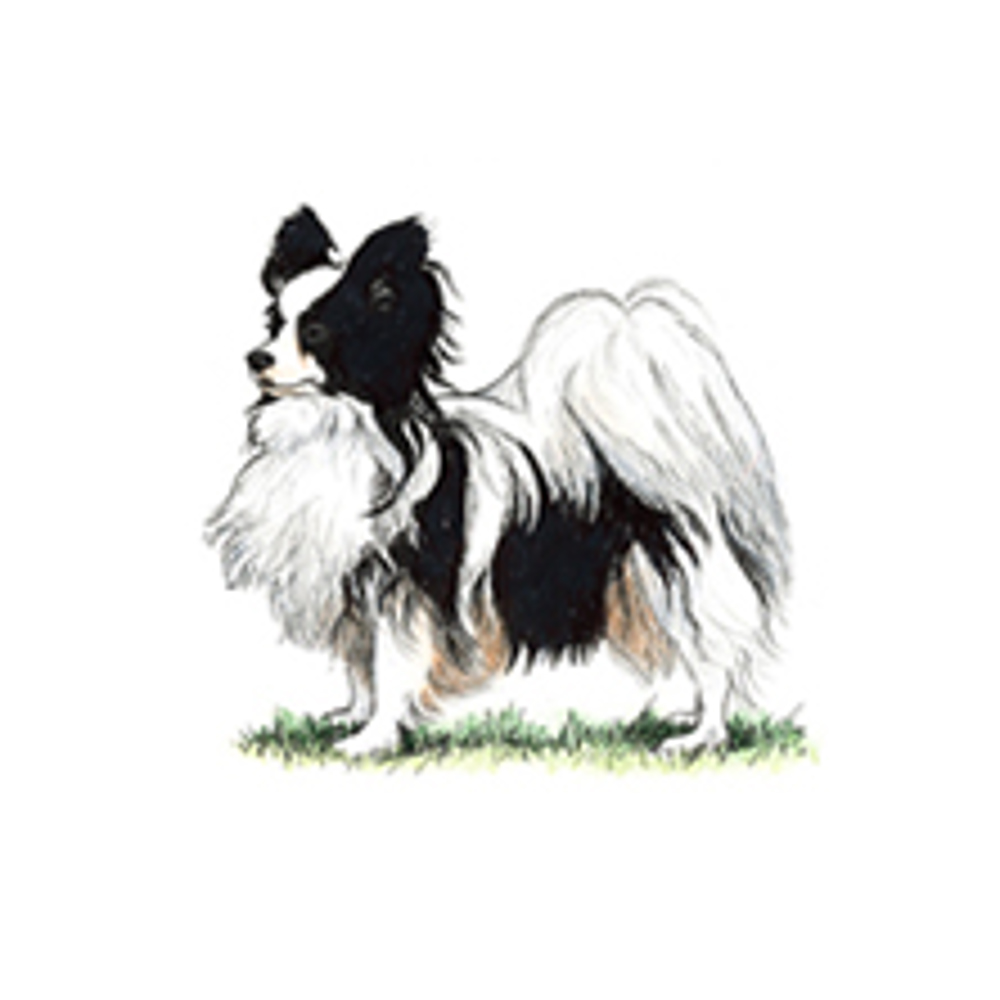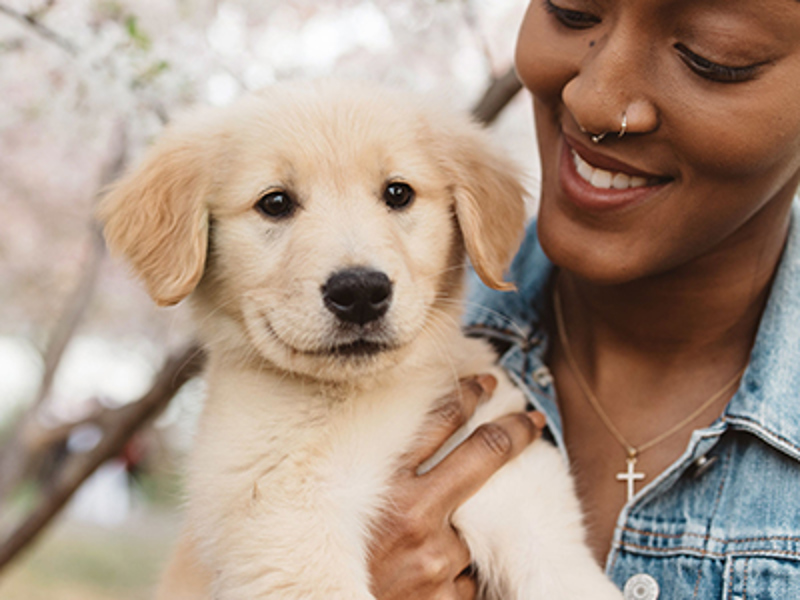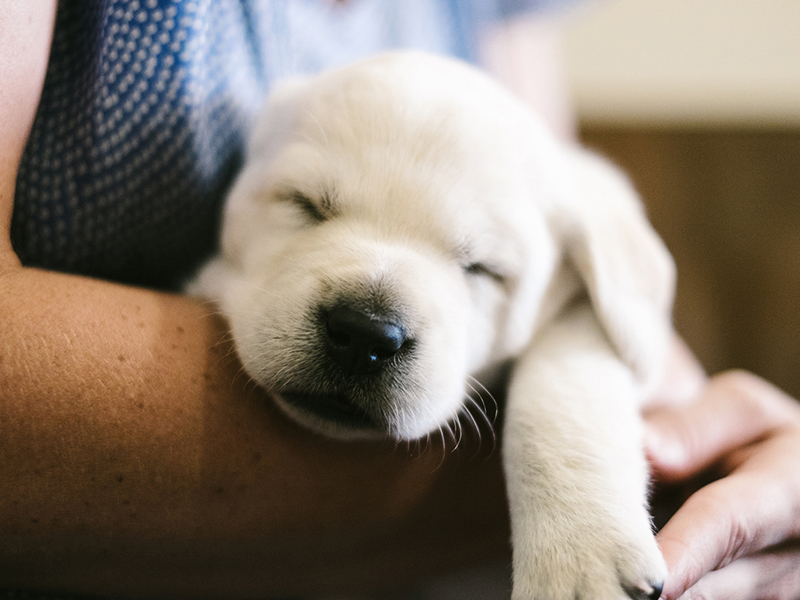
Papillon
Breed characteristics
- Size
- Small
- Exercise
- Up to 30 minutes per day
- Size of home
- Flat/ Apartment
- Grooming
- More than once a week
- Coat length
- Medium
- Sheds
- Yes
- Lifespan
- Over 12 years
- Vulnerable native breed
- No
- Town or country
- Either
- Size of garden
- No garden
About this breed
The dainty butterfly dog of France and Belgium is another described as a dwarf spaniel in Europe. The breed comes in two varieties – the Papillon and the Phalene. The well- feathered alert ears of the Papillon resemble the spread wings of a butterfly, hence the name. The drop eared Phalene is named after the folded wings of a moth. The continental spaniel title Épagneul Nain Continental (dwarf spaniel) might suggest drop ears in the original specimens. The Papillon and Phalene were hugely popular in the royal courts of Europe and were owned by many society ladies including Madame de Pompadour and Queen Marie Antoinette.
This elegant and fine boned breed is highly intelligent and competes in obedience and agility with great success.
Images for this breed
The Toy breed group
The Toy breeds are small companion or lap dogs. Many of the Toy breeds were bred for this capacity although some have been placed into this category simply due to their size. They should have friendly personalities and love attention. They do not need a large amount of exercise and some can be finicky eaters.
Breed standard colours
Breed standard colour means that the colour is accepted within the breed standard and is a traditional and well-known colour in this breed.
Breed standard colours in this breed include:
- Black & White
- Dark Red & White
- Dark Red Sable & White
- Dark Sable & White
- Dark Shaded Sable & White
- Lemon & White
- Lemon Sable & White
- Pale Red & White
- Pale Red Sable & White
- Red & White
- Red Sable & White
- Sable & White
- Silver & White
- Silver Sable & White
- Tricolour
Other colour/s
'Other' means you consider your puppy to be a colour not currently known within the breed and one that does not appear on either the breed standard or non-breed standard list. In this instance you would be directed through our registrations process to contact a breed club and/or council to support you on identifying and correctly listing the new colour.
Non-breed-standard colours
Non-breed-standard colour means that the colour is not accepted within the breed standard and whilst some dogs within the breed may be this colour it is advised to only select a dog that fits within the breed standards for all points.
Colour is only one consideration when picking a breed or individual dog, health and temperament should always be a priority over colour.
Health
Whether you’re thinking of buying a puppy, or breeding from your dog, it’s essential that you know what health issues may be found in your breed. To tackle these issues we advise that breeders use DNA tests, screening schemes and inbreeding coefficient calculators to help breed the healthiest dogs possible.
More about health
Priority health schemes and tests
The Kennel Club's Assured Breeders must use the following (or equivalent) schemes, tests and advice. All other breeders are strongly advised to also use these.
- DNA test – pap-PRA1 - part of The Kennel Club’s DNA Testing Services* (see below). Find a list of tested dogs)
- Eye screening scheme (BVA/KC/ISDS)
Important health schemes and tests
We strongly recommend that all breeders, both assured breeders (ABs) and non ABs, use the following (or equivalent) schemes, tests and advice.
- Check inbreeding calculators
- Breed club – patella testing (find out more about patella luxation)
Other health schemes and tests available
- DNA test – NAD - part of The Kennel Club’s DNA Testing Services* (see below). Find a list of tested dogs)
- DNA test - vWD type 1 - part of The Kennel Club’s DNA Testing Services* (see below). Find a list of tested dogs)
*The Kennel Club’s DNA Testing Services - simple to use and easy to organise all-in-one DNA tests
The DNA tests listed above marked with an asterisk (*) are included in our DNA Testing Services. This includes:
- NAD (Neuroaxonal dystrophy)
- Pap-PRA1 (Progressive retinal atrophy)
- vWD 1 (von Willebrand disease type 1)
Kennel Club Assured breeders and Kennel Club Accredited Instructors receive a 10% discount.
Find out more about our DNA Testing Services.
Find out about a particular dog's results
Please visit our Health Test Results Finder to discover the DNA or screening scheme test results for any dog on The Kennel Club's Breed Register.
You can also view the inbreeding coefficient calculation for a puppy's parents, or for a dog you're thinking of breeding from.
Have any questions about health in your breed?
If you have any concerns about a particular health condition in your breed then you may wish to speak to your vet or you could contact your breed health co-ordinator.
Breed health co-ordinators are individuals working on behalf of breed clubs and councils who are advocates for the health and welfare of their chosen breed. They acts as a spokesperson on matters of health and will collaborate with The Kennel Club on any health concerns the breed may have.
To contact your breed health co-ordinator please email
Breed watch
Category 1
Currently no points of concern specific to this breed have been identified for special attention by judges, other than those covered routinely by The Kennel Club's breed standard.
Breeding restrictions
There are a number of The Kennel Club's rules and regulations that may prevent a litter from being registered, find out about our general and breed specific breeding restrictions below.
More about breeding
The option to select Phalene is available when registering a litter online. For any paper applications, a note should be made next to the relevant puppy or in the form of an accompanying letter. If registered as such, the wording Phalene will appear after the breed name on the registration certificate and noted in the Breed Records Supplement.
Looking for a puppy?
Looking for a Papillon? Explore our list of puppies and rescue dogs for sale near you.
More information

Need to find out more about a breed?
Use our Find a Club service where you can locate breed clubs that can offer support and advice.

Use our Find a Puppy service
The Kennel Club's Find a Puppy service provides contact details for breeders who have puppies available. Let's help you find your new best friend.

Get the best lifetime pet insurance
At Kennel Club Pet Insurance, we want you to focus on getting the best possible treatment for your dog without worrying about the cost.
